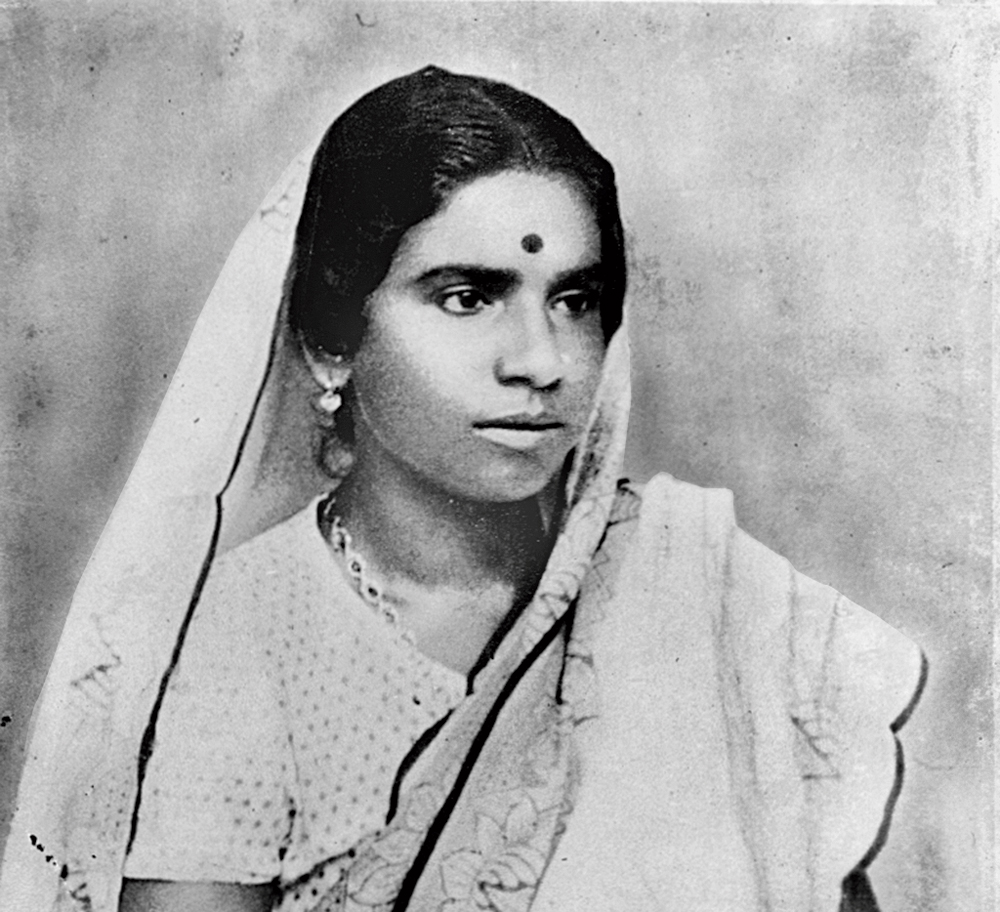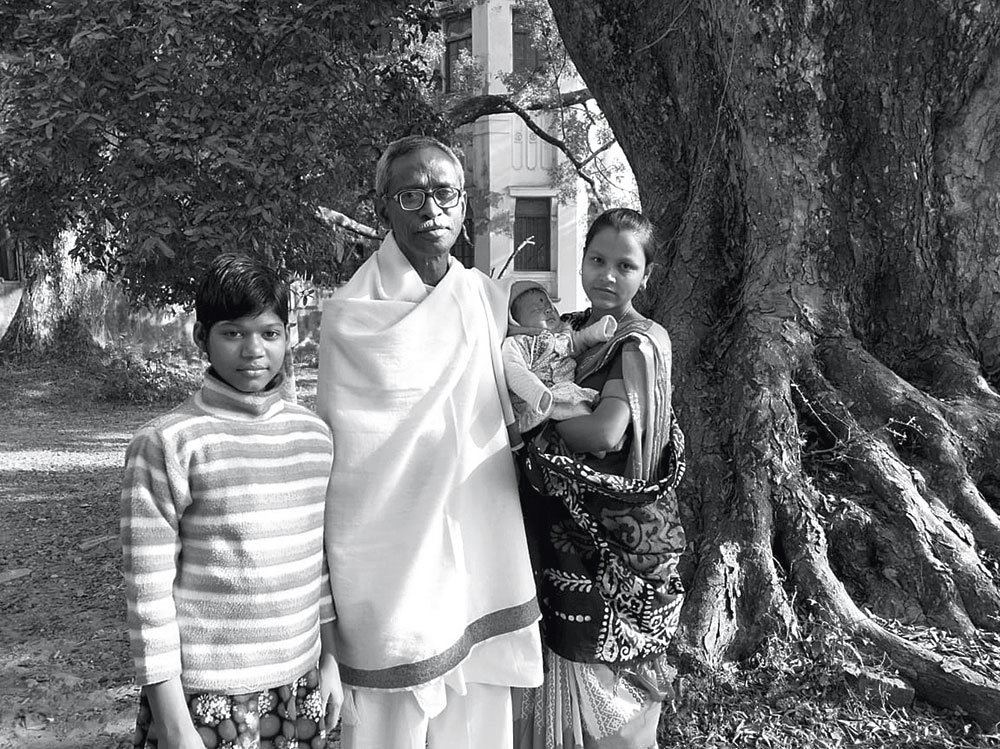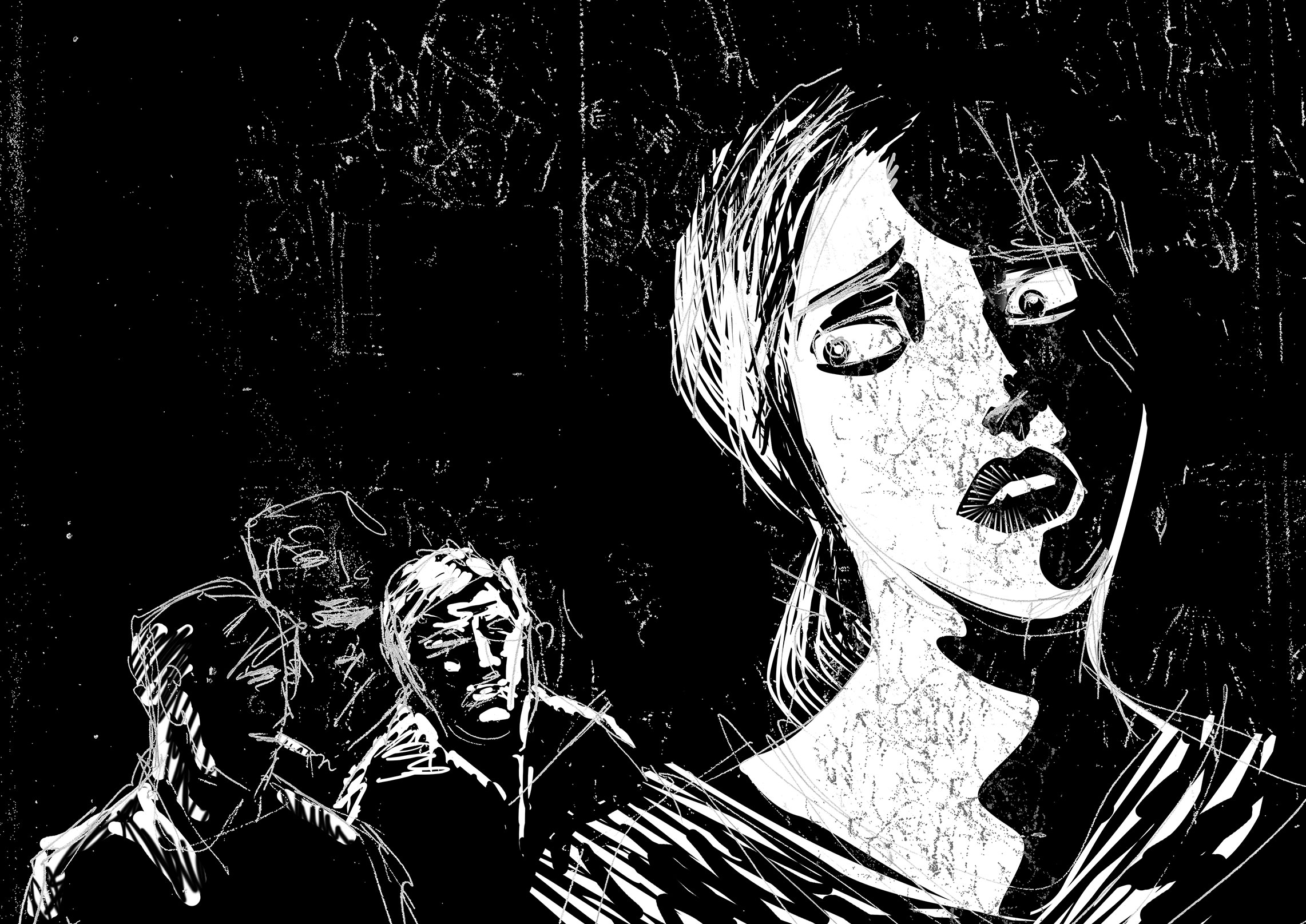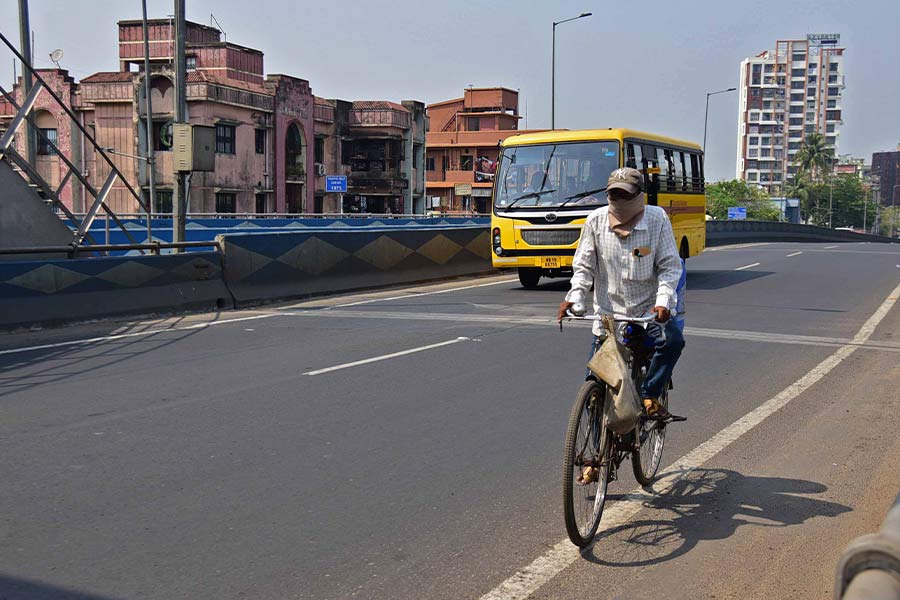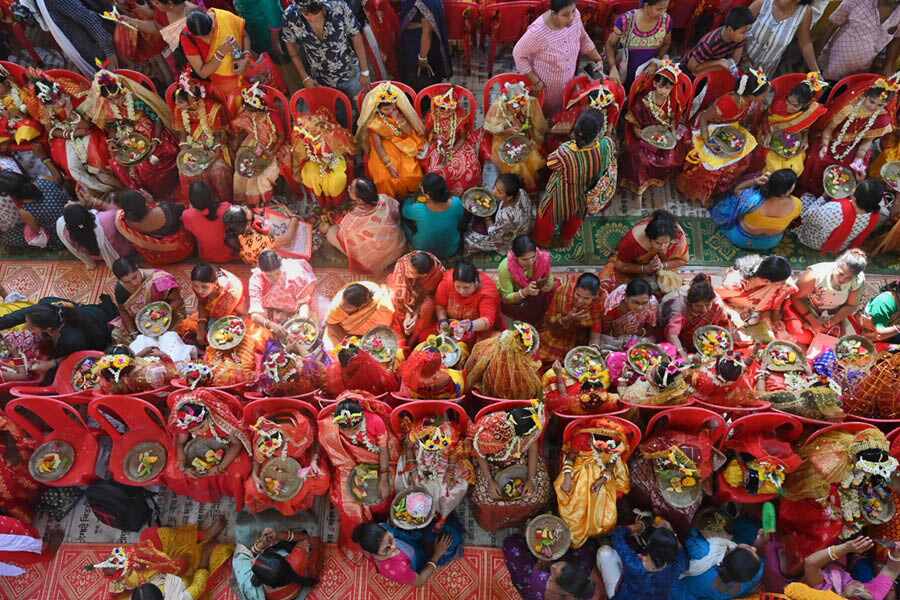Ami durbol er dikey (I am with the weaker side),” said Chapala Sundari Biswas, her eyes glaring and forefinger raised. The 80-year-old’s bold assertion in the face of conflict in the family over money matters was something to be proud of.
This was in 1991-92 in a modest house in Kanchrapara in North 24 Parganas, a joint family of unequal financial statuses. Chapala was the matriarch; her brood may have been unruly at times but always devoted to her. There was her daughter Aparna, her only child, Aparna’s husband, their sons and their families. Chapala had been mother to her seven grandchildren, their own mother being engaged in running the house and their civil servant father mostly posted outstation. There were other members too at various times, not blood relations. Finances were often a constraint.
The grande dame remained strong enough to raise a couple of great grandchildren too. Most of her later life was spent this way — clad in white, chandan on forehead, tulsi beads around her neck and jop er mala in hand.
“Boroma” was like a magical figure to her great grandchildren. Whoever spent their holidays in Kanchrapara would get to sleep in her bed, and be regaled with umpteen tales of rajas and ranis, daityas and paris. Another high point was the nokuldana, which she stored in a brass jar and distributed after puja, which was a long string of hymns and chants broken at times by the shrill ring of her ghanta. Those sugar lumps, flavoured with tulsi, seemed out of this world. Even her smell was divine — she carried a sweet fragrance of paan, only at times overpowered by the scent of Boroline.
But there was much about Boroma that her great grandchildren did not know — her eventful past that presented some very trying times. And when you put together those episodes and circumstances, and view the whole through a vintage lens, her ordinary life does not seem so ordinary, after all.
Chapala was born circa 1912 in Lakkhikati in Khulna, now in Bangladesh, into a wealthy family. Her father owned several parganas, including vast orchards by the Padma river. It is said he could not traverse the entire property in a single day even on horseback. Chapala’s eldest brother was an educated and a pious man, and his wife a kind soul. But her mejo dada possessed all the vices. Distant family members recall how he’d roll up currency notes with tobacco and puff it away. Her youngest brother, Lakshman, was the closest to her. Then there was younger sister Hari, a child widow.
Chapala studied till Class VI — it was a home school with the mastermoshai living with them. At 11 she was married off to an educated young man who held a job in the railways. It was her father’s prudence to not choose a boy from a wealthy family — what if he turned out to be a spoilt brat?
Her new home wasn’t very far away — one had to cross a river by boat. This was her husband’s elder brother’s house. Chapala had to deal with his evil wife, who was always looking for ways to harass the young bride, despite the trays full of mohor she had brought as trousseau. Her husband was helpless before his elders. Chapala’s long thick tresses were another reason for this boudi’s jealousy. Once when the little girl’s unkempt hair was infested with lice, she poured Phenyl on her, insisting it was the cure. Poor Chapala suffered much burning on her face and scalp. Again, when her father was on his deathbed, boudi refused to let her go and see him. The old man had wanted to tell his brightest child about the pots of gold and silver coins he had hidden in the fields and inside the walls, but who would listen?
At 14, Chapala gave birth to a baby girl, much to the disappointment of her in-laws. Hours after childbirth, the teen was made to walk to the pond and wash herself. She was also not given enough food and worse, her newborn was fed powdered rice boiled in water instead of milk. The mother-child duo’s condition became so alarming that a neighbour intervened. I cannot see you both die, said she, and arranged to sneak them across the river at night.
Back in her own house, Chapala’s kind boudi breastfed the infant and nursed her back to life. Although they had many cows, a goat was bought right away for Chapala. In the meantime, the evil boudi tried to get her husband remarried, who then left his house to join his wife and child. If you do not set up home elsewhere, I will not send my daughter with you, Chapala’s mother told him.
The young man then got a job at the Kanchrapara railway workshop. They rented a two-storey house and eventually Chapala’s brother, Lakshman, too took up a job there. This was a happy period in Chapala’s life. Soon they were looking after the evil boudi’s sons as well, who were sent over to them for their education. Chapala’s husband was a bit of a spendthrift — unmindful of anything, he would often go to Calcutta with friends to watch plays. When money fell short, Chapala secretly rolled bidis and made thongas for a few extra rupees.
Meanwhile, in her Khulna home, the property fell into the hands of the dissolute brother after the good brother died. The reckless man even bought an elephant to show off his status. In no time, he was swindled of everything — his rogue friends took his thumb impression on the papers by deceit. The 17-year-old Chapala rushed to Fazlul Haque, a prominent political leader of undivided Bengal, to seek help. Haque wrote to the police, lawyers and administrators in Khulna, asking them to help the young Bengali girl with a child. Chapala stood in court, answering questions and raising questions, and won back most of the land. The orchards, however, had been swallowed by the Padma. Chapala transferred the land to her name, fearing her brother would lose it all again. But this didn’t go down well with him — he accused her of playing foul. Dreadfully hurt, she returned it, saying — toder bhite tey ghughu chorbey (your land will lie deserted, frequented only by birds).
A digression here. Chapala’s widowed sister, Hari, had stumbled upon a pot of mohor in Aranghata, in Nadia district, where she was living with some relations. She found the treasure in a field where she had gone to relieve herself. With it, she built herself a house and also looked after a few less-privileged relations.
Back in Kanchrapara, Chapala led an extremely active life. Finances weren’t a problem, and she bought for her daughter the best frocks and toys, which were often British-made. Friends and neighbours advised her to undergo gynaecological treatment at the big missionary hospital in Krishnagar, so that she could have more children. Chapala mulled over it for some time but ultimately refused, saying she was happy with one daughter. Her husband too agreed. In time she decided to send Aparna to a better school in the city. For this she took the help of her husband’s senior colleague, one Mr Johnson, who wrote to the principal of a missionary girls’ school in Calcutta. Aparna was soon packed off to the boarding school.
The god-fearing Chapala was strangely free of all superstition. She understood the gender inequalities and helped many women in many ways. Her husband once brought home an orphan boy who was found near his workplace. Chapala took him in and helped him get an education. The money she spent helping others was from her savings from household expenditures. Many of these people later returned to pay their respects to her. There was also a time when she along with other women formed a “nari bahini”. These women dressed up as men, even wearing moustaches — to keep track of wayward husbands at night!
She was fearless too. Once, neighbours challenged her to go to the cemetery at night, an amavasya night, wearing her hair loose and bring back a fistful of earth. Chapala did as she was told, despite her family pleading her not to. She also had a novel way of avoiding gossip. Whenever anyone turned up at her doorstep to speak ill about a daughter-in-law or an alleged love affair, she pointed to a wall calendar she had preserved. It was a portrait of Mahatma Gandhi and his three wise monkeys.
Chapala embraced Vaishnavism. She was a regular at the hari sabhas held by pandits from Nabadwip, the birthplace of Chaitanya Mahaprabhu. On one such occasion, she got into a dispute with a pandit. From behind the curtain, she called out his feudal and outmoded beliefs, and the argument continued for a while, much to the discomfort of those present. After all, she drew her knowledge and inspiration from Chaitanya Charitamrita, Vaishnava Padavali, Gita Govinda and such texts. Some of her favourite authors were Bankim Chandra, Sarat Chandra, Ashapurna Devi and Pratibha Basu. She also read a lot of travel writing. In fact, she would be so engrossed in reading that she would often forget the dal or rice boiling on the stove.
During the 1947 communal riots, she sheltered a Muslim couple in her house despite neighbours cautioning her to the contrary. They are god-fearing humans who do not support the killings, Chapala told them, how can we not save them?
The kindness and rectitude flowing through Boroma’s veins stopped one cold January morning in 1994. Who knows, perhaps there was a lot more to this wonderful human being than could be pieced together.


